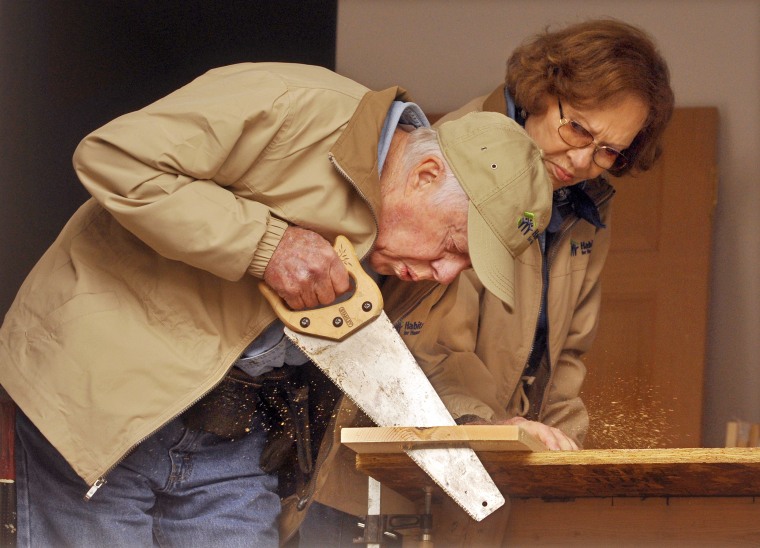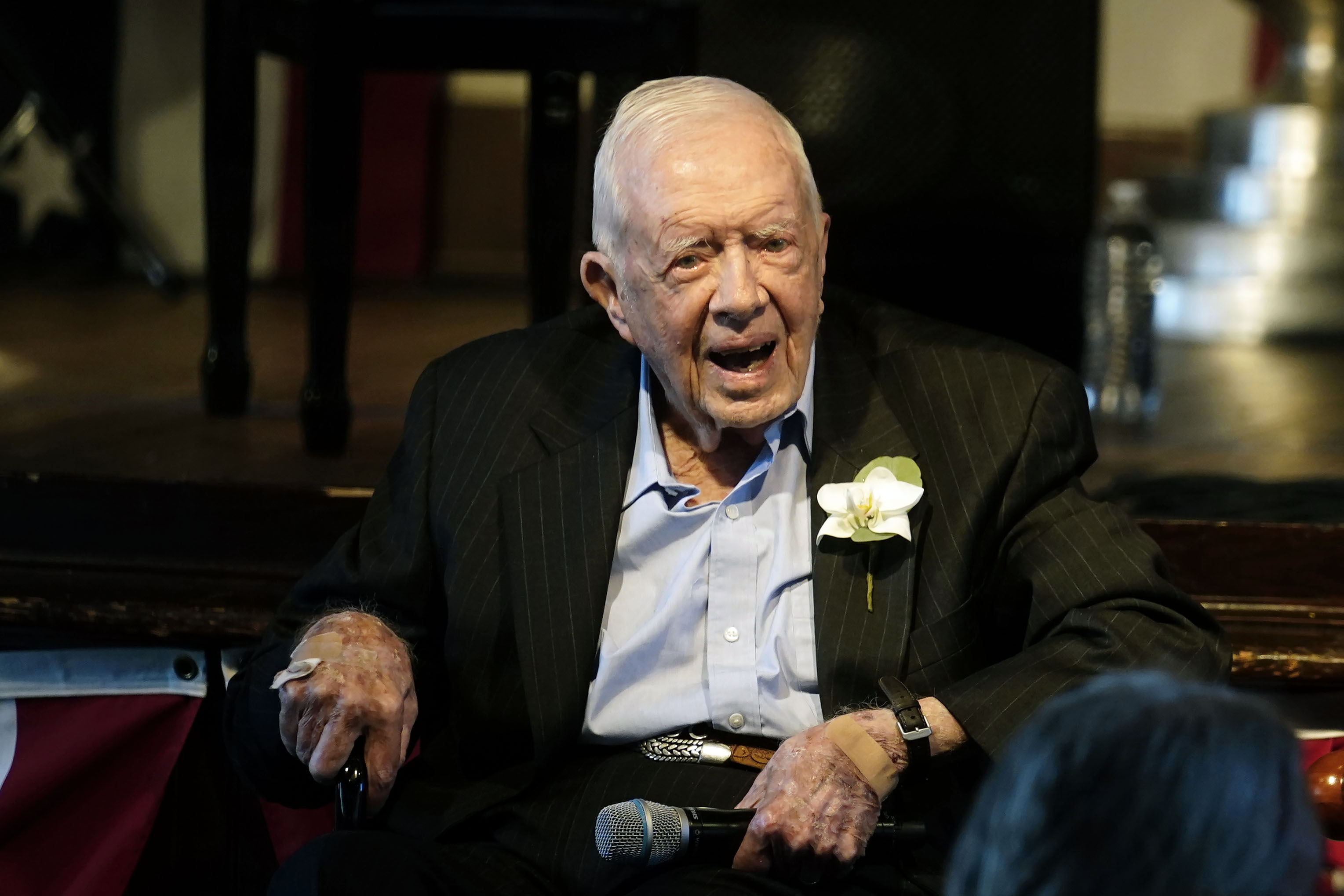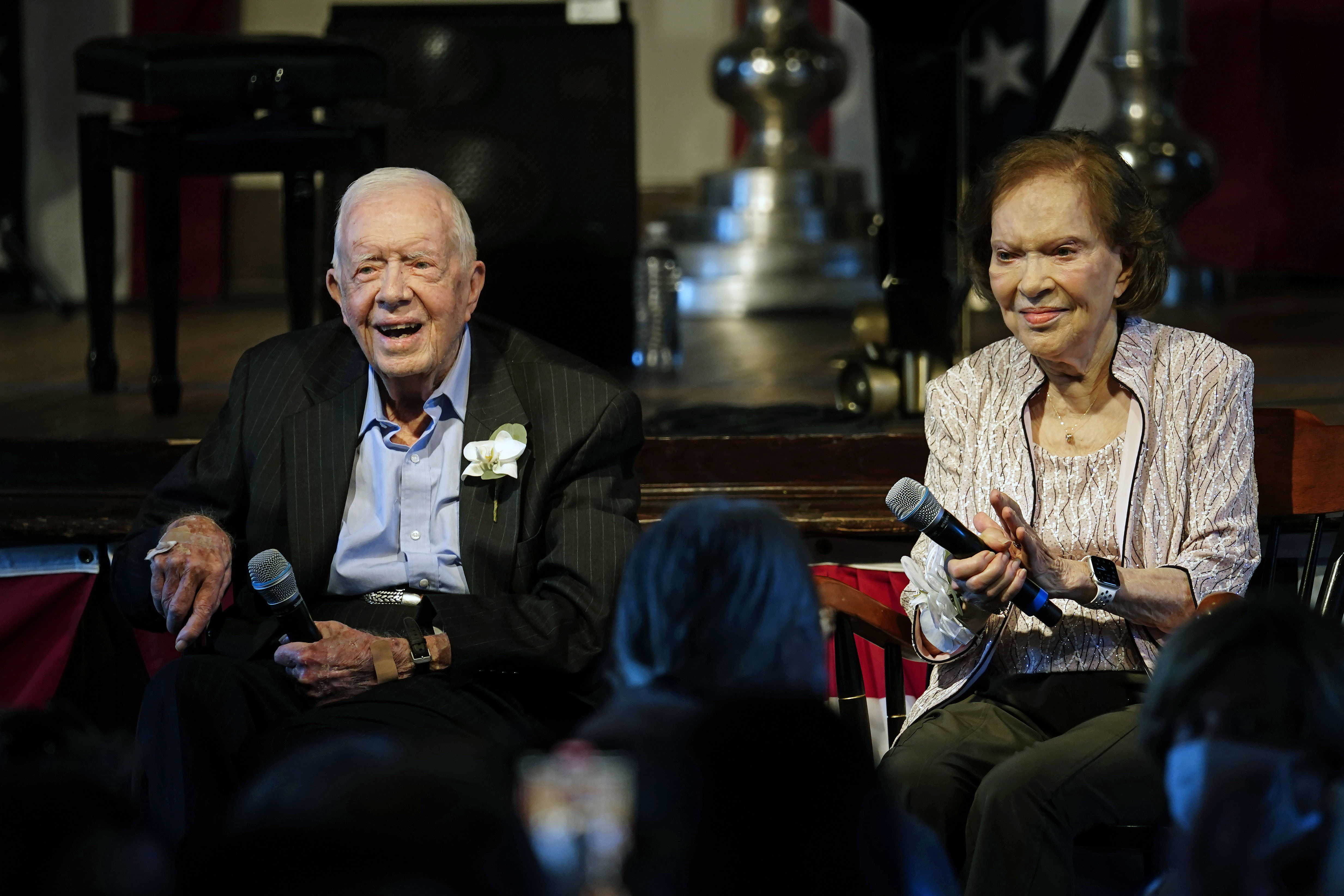Happy birthday, Jimmy Carter.
The former U.S. president — the oldest living commander-in-chief in the nation’s history — turns 99 on Sunday, Oct. 1, a milestone that seemed impossible when he entered hospice care in February 2023.
Carter, who is a cancer survivor and had suffered a series of falls in recent years, decided to spend “his remaining time at home with his family” in Plains, Georgia, foregoing additional medical intervention after several hospital stays, The Carter Center said in a statement at the time.
“We thought at the beginning of this process that it was going to be in five or so days,” Jason Carter, his grandson, told The New York Times in September 2023.
Get top local stories in Southern California delivered to you every morning. Sign up for NBC LA's News Headlines newsletter.
“I was down there with him in the hospital and then said goodbye. And then we thought it was going to be in that week that it was coming to the end. And it’s just now been seven months.”
The Jimmy Carter Library & Museum and The Carter Center are co-hosting a three-day long birthday celebration in his honor in Atlanta, starting on Friday, Sept. 29.
A week before Carter turned 99, the former president made an appearance at the Plains Peanut Festival in Georgia, riding in a car with his wife, Rosalynn, on a beautiful fall day. He still likes peanut butter ice cream, The Carter Center tweeted.
Why he's living longer than expected in hospice
Such small joys are “invaluable” to keep a terminally ill patient going, says Dr. BJ Miller, a hospice and palliative medicine physician in San Francisco. He is not treating Carter.
"It’s important for the world to see how hospice should go, and that it’s not a scary thing. It’s not about death — it really is about living until you die. I’m glad for (Carter) to be making this example,” Miller tells TODAY.com.
Patients go into hospice when doctors believe they have six months or less to live, he notes. They’re no longer trying to “push back on the illness,” so the focus becomes comfort care to ease any suffering, Miller adds. That includes medicine to alleviate pain, nausea or anxiety.
It also means emotional support for the patient and their family, talking things through and trying to find meaning in their remaining time.
But it’s “not rare” that people live longer in hospice care than expected, like Carter, Miller says. He’s seen it many times in his own practice.
It’s very difficult for doctors to pinpoint how much time a terminally ill patient has left, so they’re always guessing, Miller notes.
Another reason is that hospice care can be a relief for a patient who’s been in and out of the hospital receiving aggressive medical treatment and taking countless medications.
“At some point, a lot of that effort can be fatiguing on the body, certainly emotionally draining and sometimes even demoralizing,” Miller says.
“(In hospice), you’re no longer being pulled all over the place to try this or that treatment. Finally, there’s some peace. Finally, there’s someone listening to your symptoms. And finally, you get to stay home and the care is coming to you.”
Sometimes people live longer in hospice than they would otherwise because of that “loving, de-stressing support,” he notes.
Carter's longevity habits
Carter is the first president to live until 95 or older and the only one to live to see the 40th anniversary of his inauguration.
Genes can play a role in longevity, but Carter has a complicated family medical history. His mother lived to be 85, but his father died at 58 of pancreatic cancer. Both his sisters and his brother also died of pancreatic cancer, and his mother had the disease as well, NBC News reported.
In 2015, Carter was diagnosed with melanoma that had spread to his liver and brain. He received immunotherapy treatments and scans showed no evidence of the cancer within months. In 2019, he had a series of falls that led to broken bones and required surgery.
Still, the former president has made it to 99. Here are some of his healthy longevity habits:
Sense of purpose
Carter and his wife have famously gotten involved in the community, helping to build, renovate and repair more than 4,300 homes in 14 countries while volunteering for Habitat for Humanity since 1984. The work gave him joy, the former president wrote in one of his books.

“Community involvement tells you that you want to live, you want to help other people,” Valter Longo, Ph.D., professor of gerontology at the University of Southern California and director of the USC Longevity Institute in Los Angeles, tells TODAY.com.
“You have a reason to keep doing all the things that you need to do,” he notes, like going to the doctor, eating a healthy diet and exercising. “In the end, (it’s) whatever gets you out of bed.
Volunteering helps people stay engaged with others and contribute, Miller adds.
“You need to put love into the world and care in the world. And that, too, is a lifeblood,” he says.
Strong family ties
Carter and his wife, Rosalynn, have been married for 77 years — the longest-married couple in presidential history. Carter has called it “a full partnership.”
Their children, grandchildren and great-grandchildren complete the tight-knit family.

Committing to a life partner, caring for children and putting family first is a key part of longevity, researchers studying the Blue Zones, places around the world where people live long lives, have found.
It’s important to be part of a loving connection, though it doesn't have to be a marriage per se — it can be a spouse, but also a sibling, a friend or any relationship where a person feels seen and heard, Miller says.
On the flip side, Longo has also seen many centenarians display extraordinary resilience when it comes to marital status.
Some are "warriors of longevity and nothing bothers them — whether they are alone or with somebody,” he notes. “They’ll say, ‘I find happiness in lots of other things.'”
Regular exercise
Carter was an avid runner until he was 80 and developed knee problems, so he switched to swimming and walking, he told The Washington Post in 2013 and 2018.
He and Mrs. Carter liked to ride bikes in their hometown as well as on trips across the country and abroad. The former president also enjoys fly-fishing and woodworking, according to his biography.
Exercise affects every cell in the body and is vital for good health, experts say.
Faith
Since leaving the White House in 1981 until 2020, Carter regularly taught Sunday school at Maranatha Baptist Church in Plains, Georgia, where he and his wife attended services.
“Our religious beliefs are important to us,” the former president wrote in one of his books.
Just like having a sense of purpose, religion can help people do the right things for their health and keep going, Longo says.
Faith can be a source of meaning and belonging, which is good for the body and soul, Miller adds.
“We can push and prod at the body to keep going in all sorts of ways. But if there’s no spark, if there’s no reason to live, if there’s no joy in living” it won't help much, he says. "Those are essential ingredients for life."
This story first appeared on TODAY.com. More from TODAY:



